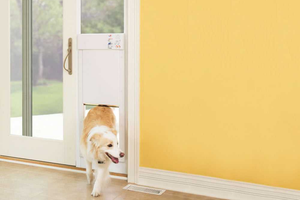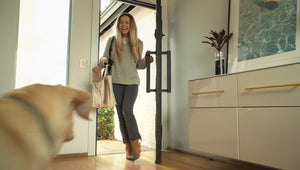Installing a Cat Door in Your Home
Does your cat enjoy basking in the sunshine outside, or roaming the neighborhood to socialize with their fellow felines? Maybe you have a cat who loves your plush sofa as much as your backyard bushes. With active pets like these, it’s easy to start feeling like a doorman having to constantly let your cat in and out of the house.
Benefits of Installing a Cat Door:
- Give cats the freedom to come and go safely
- You no longer have to play 'doorman' to your cat
- Enjoy a range of installation styles from manual to electronic
If you're constantly having to let your cat in and out, it might be time to invest in a quality cat door.
Why Get a Cat Door?
Like many loving cat owners, you probably get caught in the same dilemma whenever you want to leave the house. Do you leave your feisty feline inside where they can bump against your furniture and scratch your doors? Or do you lock them outside where they can get hurt? What is a cat owner to do?
Of course, every pet parent wants to be able to afford a cat sitter. But have you seen this economy? We have got to be joking!
Well, we are.
Instead of hiring a pricey pet sitter or officially becoming your cat's professional doorman, purchase a cat door. Cat doors are great investments that give your cat the freedom to come and go as they please while keeping your house safe.
Installing a cat door isn't even that hard. And we'll show you that, with the right tools and proper guidelines, your brand new exterior door cat door will be ready to use in no time.
In fact, you will hardly break a sweat when you fix up a solid cat door for your pet if you follow our lead. Cat flap doors can be installed in all sorts of places. Maybe you want one on your garage door, laundry room door or closet door to give them access to their cat food or litter box (or keep your feline friends from fighting over the cat food or litter box). Or maybe you have an indoor cat and want one on your bedroom door to let them in without having to open and close the door constantly.
Whatever door you want, this guide will help you install it. Without further ado, let’s get started!

The Prep: What Do You Need Before You Start Installation?
Here are a few pre-installation tips that will make your job easier:
Measure Your Pet
A word to the wise, you should never buy a cat door for doors (or elsewhere) without measuring your pet. Otherwise, you might wind up with a flap too small for your cat. And if it is too big then it acts as an open invitation to big stray cats and dogs into your home.
So as a precautionary measure, measure your cat. This way, whether you have small or large cats, you will end up with the right size door for them. Take measurements from the cat’s feet to their shoulders. Apart from the height, try to gauge other factors like the width and the distance between the cat’s under-bellies to the head before you dive into learning how to install a cat door. You can use a cardboard cutout in the dimensions you think to visualize whether or not they will work for your cat.
Pro-tip: Keep the opening width two-inches wider than the widest part of your pet. The same goes for height.
Our tip comes in handy in two ways. Firstly, your pet won’t get stuck if your measurements were incorrect. Secondly, a slightly bigger pet door means that you won’t face any problems if your cat gets bigger as they age. This way you won't have to waste money replacing a pricey, high-quality door just because your cat no longer fits through.

The Door
After noting the measurements, it’s time to shop! You will be happy to know that there is a wide variety of pet doors out there. Like double-flapped, single-flapped, self-framed and frameless. You can have an interior door with a cat door, or an exterior door, or a cat door for interior walls…and the list goes on. The PetSafe Electronic Smart Door, Cat Mate Elite Electronic door, and Ideal Pet Products E-Cat Door are some more options featuring an electronic door lock to keep critters out. One thing to to keep in mind with microchip cat doors is that due to limited frequency range, they won't work with large dogs (but are a great home improvement option for your cats!).
The trick to choose the best door is keeping in mind:
- Your pet measurements
- The thickness of your doors
- Feasibility
- Durability
Pro-tip: Most interior doors have hollow cores. This is why we advise you to purchase a hassle-free self-frame door. Not only will they cut-down the installation process, but they will also protect the hollow core of the door from weather and water damage. Plus, they provide a smoother, neater finish!
Plus, they give your DIY-project a smoother, neater finish!
The Location
Done with the shopping part? Now, all you have to do is to select where you want to place your cat door. You can have one cat door for the main door of your house. Then if you are feeling generous, you may also install cat doors for interior doors leading to rooms your cat frequents (e.g. the kitchen!). This allows your precious pet to have easy access inside and outside the house.
The Tools

Here is a list of the tools you will need:
- Measuring tape
- Pencil
- Ruler
- Drill
- Drill bits
- Earmuffs or earplugs
- Dust mask
- Jigsaw
- Safety glasses
- Screwdriver
- Utility knife
- Workbench (optional)
- Pet door kit
- Masking tape
The Guide: Step-by-Step Guide to Installing Your Cat Door

Step-1: Purr-fect Position
Use a pencil and ruler to properly mark the area where the door has to be installed. Make sure that the marking is leveled. The pet door will be approximately 10-12 inches above the floor.
Many pet door kits include a template that will help you draw the borders.
Pro tip: Take out your door from the hinges before you start the installation.

Step-2: Drill Away
Next, as a safety measure, you should place masking tape around the corners of the template you drew. Then drill four holes in each edge of the drawn pattern these work as the access points for your jigsaw.

Step-3: Start Cutting
Now, comes the tricky part. You will have to insert the jigsaw into one of the drill holes, and then steadily cut according to the template line you had drawn. The template allows you to cut an accurate opening to fix your cat door.

Step-4: Attachment
Did you buy a self-framing door? That’s great!
Because all you have to do is attach the pet door to properly place the pet door into the hole you just cut. Remember to secure both sides of the door with screws.
Have a Hollow Core Door but bought a Frameless Door?
You can’t attach the pet door without making your frame. So what do you do?

Frame It Out Yourself!
Here is what you will have to do:
- Measure the interior dimensions of the cat door hole you have cut.
- Then cut 4 pieces of wooden plank according to those calculations.
- Apply glue to the planks to create a framework.
- Clamp those planks.
- Let it dry!
- Then fix it inside the hollow wooden door. Make sure that your homemade frame aligns perfectly with the hole.
Done? Now, please go to step 4 and attach your pet door.
What’s Next?
Once your cat door has been installed, it is time to train your furry feline. Remember, it might take a few attempts and some time to make it used to the door. But once your cat gets used to its customized door, it will be flapping in and out like a pro!
So are you ready to drop your doorman duty? If so, check out some of our cat door recommendations:









Hi Elizabeth,
Usually, you should know the cat size in order for us to recommend the right pet door. You’ll probably want a SureFlap microchip pet door, which has a mounting adapter that can be installed in glass that is sold separately.
Please contact us at customerservice@petdoors.com or give us a call at (805) 781-7700 so that we can get more details and give you a better recommendation. Thanks!
How much is a microchip cat door and how much does it cost if you have it in stalled in glass. Is it better getting cat first or the door installed first
Hi Louis,
Thanks for the question! For glass door installations, you’ll want to take a look at our options on this page: https://www.petdoors.com/blogs/dog/in-the-glass-pet-doors
Because glass is a tricky installation type, you might want to consult one of our customer service representatives before making any final decisions or purchases to ensure you pick the right product and size for you and your pet. Please email us at customerservice@petdoors.com for further assistance.
Thanks!
Good morning. Can you please assist me with cat door in my glass door. 300×300mm. Thx Louis.